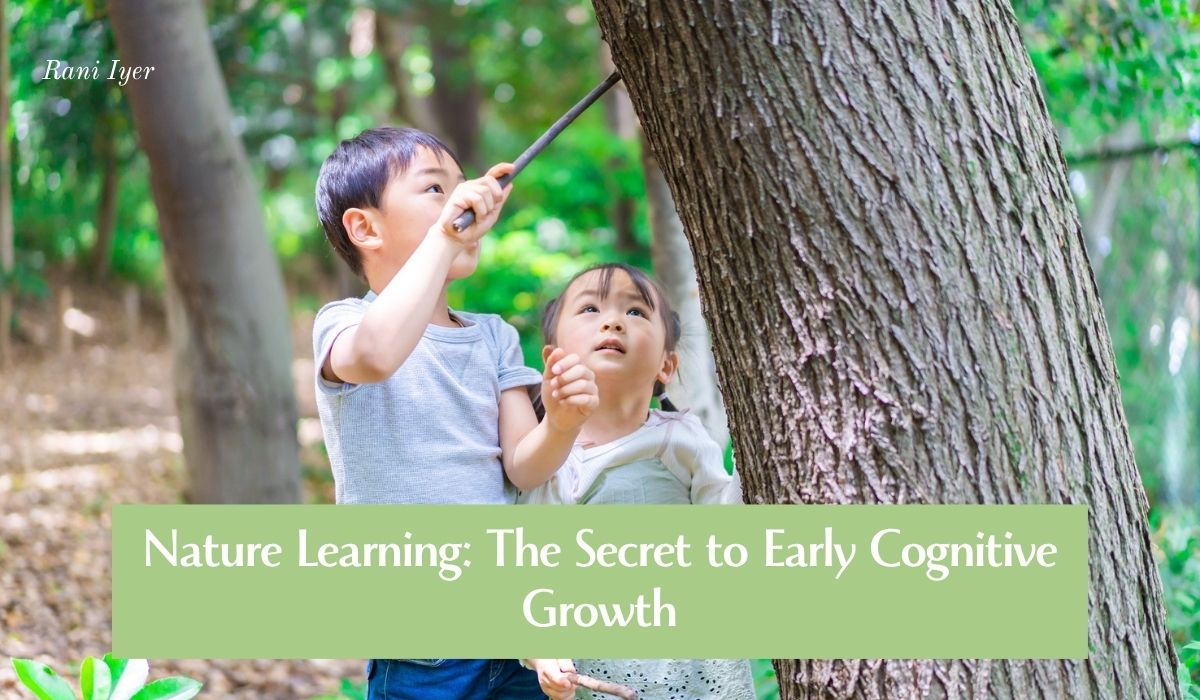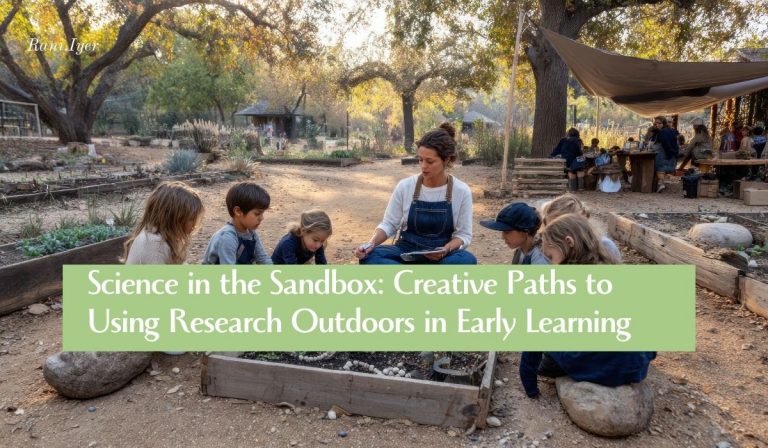Our world is increasingly dominated by artificial interfaces-screens and structured environments. In this scenario, the natural world emerges as a vital playground for young minds. Nature-based learning offers children a unique opportunity to connect with their environment, fostering curiosity and creativity in ways that traditional classrooms often overlook. As they explore the great outdoors, children engage in hands-on experiences that enhance cognitive growth, building critical thinking and problem-solving skills.
From the rustling of leaves to the songs of birds, each element of nature serves as a catalyst for discovery, promoting emotional and social development. As educators and parents recognize the profound impact of this unstructured play, there’s a growing movement to integrate nature-based learning into early childhood education. Join us as we delve deeper into how this approach not only nurtures a love for the environment but also equips young learners with essential skills for lifelong success. Together, let’s unlock the potential of our youngest learners through the wonders of nature.
The Importance of Cognitive Development in Early Childhood
Cognitive development in early childhood is a critical phase that lays the foundation for a child’s future learning and overall growth. During the first few years of life, children’s brains are incredibly malleable, making this period an optimal time for fostering cognitive skills. These skills include memory, attention, language, problem-solving, and critical thinking. As young children explore their environment, they continuously build and refine these abilities, which are essential for their academic success and social interactions.
From birth to age five, children experience rapid brain development, forming connections at an astonishing rate. This period is marked by a significant increase in the number of synapses, the connections between neurons. The brain’s plasticity during these early years means that children are especially receptive to new experiences and learning opportunities. Therefore, providing enriching and stimulating environments during this time is crucial for maximizing cognitive development.
Moreover, early cognitive development is closely linked to emotional and social growth. As children learn to navigate their surroundings, they develop self-regulation, empathy, and social skills. These capabilities are essential for forming healthy relationships and adapting to various social settings. By understanding the importance of cognitive development in early childhood, parents and educators can create supportive environments that nurture young minds, setting the stage for lifelong learning and success.
Key Principles of Nature-Based Learning
Nature-based learning is an educational approach that integrates the natural environment into the learning process. This method is grounded in several key principles that distinguish it from traditional classroom-based education. One of the fundamental principles is experiential learning, which emphasizes hands-on, real-world experiences as the primary mode of learning. By engaging directly with nature, children can explore and discover at their own pace, fostering a sense of curiosity and wonder.
Another core principle of nature-based learning is the importance of play in development. Play is a natural and essential part of childhood, allowing children to experiment, solve problems, and express themselves creatively. In a natural setting, play becomes even more enriching, as children interact with diverse elements such as plants, animals, and natural materials. This type of unstructured play encourages imagination and innovation, helping children develop critical cognitive and social skills.
Additionally, nature-based learning promotes a holistic approach to education, recognizing the interconnectedness of cognitive, emotional, social, and physical development. By immersing children in natural environments, this approach supports their overall well-being and fosters a deeper connection to the world around them. Educators who embrace nature-based learning prioritize creating opportunities for children to engage with nature regularly, understanding that these experiences are integral to their growth and development.
Benefits of Nature-Based Learning for Young Children
Nature-based learning offers a multitude of benefits for young children, impacting various aspects of their development. One of the most significant advantages is the enhancement of cognitive skills. Outdoor environments provide rich sensory experiences that stimulate brain development. The diverse sights, sounds, and textures found in nature engage children’s senses, promoting observation, analysis, and critical thinking.
In addition to cognitive benefits, nature-based learning supports emotional and social development. Being outdoors allows children to experience a sense of freedom and autonomy, which contributes to their confidence and self-esteem. Moreover, natural settings often encourage cooperative play and teamwork, as children work together to explore, build, and solve problems. These interactions help them develop essential social skills such as communication, empathy, and conflict resolution.
Physical health is another area where nature-based learning excels. Outdoor activities promote physical fitness, improving children’s motor skills, coordination, and overall health. Regular exposure to nature also has positive effects on mental health, reducing stress and anxiety while enhancing mood and attention. By integrating nature into the learning process, children can enjoy a balanced and holistic approach to education that nurtures their minds, bodies, and spirits.
How Nature Interacts with Cognitive Growth
The interaction between nature and cognitive growth is profound and multifaceted. Natural environments provide a dynamic and ever-changing landscape that stimulates children’s curiosity and problem-solving abilities. For example, observing the life cycle of a plant or the behavior of animals in their natural habitat offers valuable lessons in biology, ecology, and environmental science. These hands-on experiences encourage children to ask questions, make predictions, and draw conclusions, all of which are critical components of cognitive development.
Furthermore, nature-based learning supports the development of executive functions, which are higher-order cognitive skills that include planning, decision-making, and impulse control. Activities such as navigating a trail, building a fort, or organizing a scavenger hunt require children to set goals, create strategies, and adapt to changing circumstances. These experiences help them develop the ability to think flexibly, manage their actions, and achieve desired outcomes.
Attention restoration theory also highlights the cognitive benefits of nature. According to this theory, natural environments have a restorative effect on attention, helping to alleviate mental fatigue and improve focus. The inherent qualities of nature, such as its complexity and unpredictability, capture children’s attention in a gentle and involuntary manner, allowing their directed attention to rest and recover. This restorative effect enhances their ability to concentrate and perform cognitive tasks more effectively.
Implementing Nature-Based Learning in Early Childhood Education
Integrating nature-based learning into early childhood education requires thoughtful planning and a commitment to creating meaningful outdoor experiences. One effective approach is to design outdoor classrooms that provide a variety of natural elements and opportunities for exploration. These spaces can include gardens, ponds, sandpits, and wooded areas, offering diverse environments for children to engage with. By incorporating natural materials such as logs, stones, and water, educators can create stimulating and interactive learning settings.
Another key aspect of implementing nature-based learning is developing a curriculum that aligns with outdoor activities. Educators can design lessons that incorporate nature-themed projects, such as studying local ecosystems, planting and caring for a garden, or observing weather patterns. These activities can be integrated into various subjects, including science, math, language arts, and art, providing a multidisciplinary approach to learning. By aligning the curriculum with outdoor experiences, educators can create a seamless connection between nature and academic content.
Professional development and training for educators are also essential for successful implementation. Teachers need to be equipped with knowledge and skills to facilitate nature-based learning effectively. This includes understanding the principles of outdoor education, recognizing the developmental benefits of nature, and learning how to create safe and engaging outdoor experiences. Providing ongoing support and resources for educators can help them feel confident and inspired to incorporate nature into their teaching practices.
Case Studies: Successful Nature-Based Learning Programs
Numerous successful nature-based learning programs around the world demonstrate the positive impact of this educational approach. One notable example is the Forest School movement, which originated in Scandinavia and has since spread globally. Forest Schools emphasize regular and sustained outdoor sessions in natural environments, where children engage in child-led activities such as building shelters, exploring wildlife, and creating art from natural materials. Research on Forest Schools has shown significant benefits in children’s confidence, social skills, and cognitive development.
Another example is the Nature Preschool model, which integrates nature into the daily curriculum of early childhood education. Nature Preschools create immersive outdoor experiences, where children spend a substantial portion of their day learning and playing in nature. Programs like the Nature Preschool at the Schlitz Audubon Nature Center in Wisconsin have reported improvements in children’s attention, creativity, and problem-solving abilities. These programs highlight the effectiveness of nature-based learning in fostering holistic development.
Internationally, programs like the Bush Kinder in Australia provide further evidence of the success of nature-based learning. Bush Kinder programs take place entirely outdoors, regardless of weather conditions, encouraging children to develop resilience and adaptability. Studies on Bush Kinder programs have shown positive outcomes in children’s physical health, emotional well-being, and environmental awareness. These case studies underscore the transformative potential of nature-based learning and its ability to support diverse aspects of children’s development.
Challenges and Solutions in Nature-Based Learning
While nature-based learning offers numerous benefits, it also presents certain challenges that educators and parents must address. One common challenge is ensuring safety in outdoor environments. Natural settings can pose risks such as uneven terrain, exposure to weather elements, and encounters with wildlife. To mitigate these risks, educators need to conduct thorough risk assessments and establish clear safety protocols. Providing appropriate supervision and training children in outdoor safety practices can help create a secure learning environment.
Another challenge is the accessibility of natural spaces, particularly in urban areas where green spaces may be limited. To overcome this, educators can seek creative solutions such as utilizing community parks, school gardens, or creating green spaces within school grounds. Collaborating with local organizations and nature centers can also provide opportunities for children to experience nature. Additionally, incorporating nature-themed activities and materials indoors can help bring elements of nature into the classroom when outdoor access is restricted.
Funding and resources can also be a barrier to implementing nature-based learning programs. Securing financial support for outdoor classrooms, materials, and professional development can be challenging for schools and early childhood centers. To address this, educators can pursue grants, partnerships, and community support. Engaging parents and the wider community in fundraising efforts and volunteer opportunities can also help garner the necessary resources. By finding innovative solutions to these challenges, educators can create enriching nature-based learning experiences for all children.
Resources for Educators and Parents
To support the implementation of nature-based learning, there are numerous resources available for educators and parents. Books such as “Last Child in the Woods” by Richard Louv and “The Nature Principle” by the same author provide valuable insights into the importance of nature in children’s lives and offer practical ideas for integrating nature into education. Additionally, “Balanced and Barefoot” by Angela Hanscom explores the benefits of outdoor play for children’s development and provides strategies for encouraging nature-based activities.
Online resources and organizations also offer valuable support for nature-based learning. The Children & Nature Network, founded by Richard Louv, provides a wealth of information, research, and tools for promoting nature connections for children. Similarly, the Forest School Association offers resources, training, and certification for educators interested in implementing Forest School principles. Websites like Nature Explore and Project Learning Tree provide lesson plans, activities, and professional development opportunities for incorporating nature into early childhood education.
Local nature centers, parks, and environmental organizations can also be valuable partners in nature-based learning. These organizations often offer programs, workshops, and field trips that provide hands-on experiences for children. Collaborating with these organizations can enhance the learning opportunities available and provide additional expertise and resources. By utilizing these various resources, educators and parents can effectively support and enrich nature-based learning experiences for young children.
The Future of Nature-Based Learning in Early Childhood Education
As the benefits of nature-based learning become increasingly recognized, the future of this educational approach looks promising. Integrating nature into early childhood education offers a holistic and enriching experience that supports cognitive, emotional, social, and physical development. By fostering a deep connection to the natural world, nature-based learning cultivates a sense of wonder, curiosity, and respect for the environment in young children.
The growing movement towards outdoor education and nature-based learning reflects a shift in understanding the importance of unstructured play and hands-on experiences in fostering cognitive growth. As more schools and early childhood centers embrace this approach, we can expect to see a positive impact on children’s overall development and well-being. The continued support and advocacy from educators, parents, and communities will be essential in sustaining and expanding nature-based learning opportunities.
How Nature Play Nurtures Young Minds: The Ecolabs Approach
In a world where screens often replace soil, Ecolabs is bringing back what childhood has always known instinctively — that play and nature are the greatest teachers. Research in early childhood development shows that unstructured, sensory-rich play outdoors strengthens the very foundations of learning — memory, focus, problem-solving, and creativity. When children engage with the natural world, every leaf, rock, and birdsong becomes a cognitive exercise: they compare shapes, classify patterns, and develop the mental flexibility that fuels higher-order thinking.
Ecolabs channels this power of nature play into beautifully designed, evidence-based resources that spark curiosity and exploration. Whether children are matching seeds in a memory game, following clues in an outdoor scavenger hunt, or weaving stories with their “Nature Tales Dice,” they are doing far more than playing — they are building neural pathways that support attention, observation, language, and reasoning. The tactile, multisensory nature of Ecolabs games engages all parts of the brain, turning learning into a joyful, embodied experience rather than a passive one.
Most importantly, these experiences teach children to think systemically — to see relationships, not just objects. Understanding how a bee connects to a flower or how sunlight changes a shadow introduces concepts of cause and effect, pattern recognition, and ecological balance — all key elements of cognitive development. By combining sustainability, playfulness, and pedagogy, Ecolabs helps children grow not just smarter, but more aware, empathetic, and connected to the living world around them.
In conclusion, unlocking young minds through nature-based learning is a powerful way to nurture cognitive growth and equip children with essential skills for lifelong success. By providing meaningful and engaging outdoor experiences, we can create a brighter and more connected future for our youngest learners. As we move forward, let us continue to champion the wonders of nature and its invaluable role in early childhood education.



